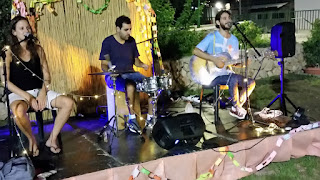Due to the timing of the Jewish New Year, we had a five day holiday this year (Friday through to Tuesday). I spent a few hours every day working on my doctoral submission, which to me was the most important use of my time. In perfect synchronicity, I received a notification this morning that an academic paper had been uploaded which matched my interests. In the flash of an eye, I downloaded it, read it and managed to incorporate a paragraph about this paper in my submission. I sent the submission to my supervisor today. I know that it's still not ready for submission to the research committee but it's definitely getting there.
Another activity on which I spent time was swimming. Equipped with my new mp3 player and increased stamina, I knocked off 32 lengths of Saturday. I thought that I would go swimming each day for a slightly shorter distance; 20 lengths on Sunday left me too tired to swim on Monday, but today I swam 24. I only woke up at 8:15 (very unusual for me) and the pool opened at 9am.
I also devoted a fair amount of time to that particularly Jewish trait, cooking for festivals. I cooked meat balls on Friday, salmon on Saturday, had Sunday off, and cooked chicken drumsticks last night. The fridge is full of left-over food.
Yesterday morning, I recorded vocals for my new song, "Say what you will". I should have spent more time singing the song, as the takes which I kept were very bassy, and there were also phrasing issues. I solved the phrasing issues by "getting out the razor blade" and editing the take which I had designated as the keeper; until the final mix I was still removing fractions of seconds of silence in order to align the words correctly. Mixing the song was problematic: I had great difficulty in getting a good tone for the vocals and then getting the vocals to be at the correct volume. I 'mastered' the song maybe twenty times, each time making small changes in the vocal volume in order to get the result which I wanted. I've left the song for the time being, but will probably return to it on Friday with fresh ears.
But funnily enough, most of my spare time went to cricket: the five day holiday coincided with the five days of the last test match this summer, between England and India. I have, in fact, been following all the games this year, although I have no way of actually watching them; the Guardian had an over by over website which tells what happens for those unable to watch. Almost all of the matches have been intriguing, but some have finished in four days.
This test might easily be called a fairy tale match, for several reasons. Firstly, it was the last test match of Alastair Cook (pictured right), England's opening batsman; he announced before the game that he was laying down his bat after 12 years of test match cricket. He had a good first innings, but what made it a fairy tale was his second innings of 147 runs. Not unsurprisingly he has been named Man of the Match.
The second reason was England fast bowler James Anderson (pictured left above), who also broke a record by taking 564 Test wickets - more than any quick bowler in the history of Test cricket. Although he equalled the record early on in the second Indian innings, it seemed that he would not progress - until he took the final Indian wicket.
Aside from these records being broken, the game itself was fascinating. England made 332 in their first innings, due to Cook but also due to a ninth wicket stand of 98. India tried hard but their innings ended on 292, giving England a 40 run lead. The second English innings didn't start too well, but then Cook and captain Root combined for a 260 run third wicket stand! Then both Root and Cook went, almost in consecutive balls. I thought that England would declare at this stage, or at tea, which shortly followed, but they carried on for nearly another hour, amassing a total of 423 runs.
The timing of a declaration can be a tricky business: I thought that Root hadn't left enough time for England to bowl out India, but at first it seemed that Root had been vindicated, when India lost their first three wickets for only two runs! Their captain went first ball. But then a partnership formed which saw out yesterday evening and the morning session today. For a short period, it seemed that India might even amass the total needed to win, although a draw seemed a likelier option. But then the English bowlers struck again, and India finally succumbed for a total of 345; England won by 118 runs - with only 13 overs remaining.
What a game! It was fascinating reading about it, and it must have been unbelievably tense to have actually been there.
And after all that - back to work tomorrow, with a trip to Karmiel.








